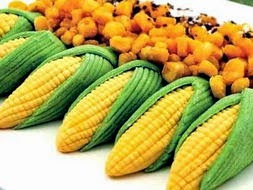 |
| Kidney disease |
corn is rich in antioxidants and beneficial phytonutrients, and asserts that canned corn might offer more benefits than the fresh variety. When cooked, corn releases a compound called ferulic acid, which might help prevent cancer. In addition to ferulic acid, canned corn contains healthy amounts of minerals and vitamins. One cup contains 420 mg of potassium, significantly more than the amount found in a small banana. This essential mineral is necessary for maintaining stable blood pressure. Canned sweet corn also provides 2.404 mg of niacin -- or vitamin B-3 -- per cup. Vitamin B-3 helps release energy from food, reduce high blood pressure and maintain a healthy digestive tract. Finally, lutein and zeaxanthin -- a pair of antioxidant carotenoids that might help prevent macular degeneration, an age-related eye disease -- are present, with 82 mg per cup.
Sodium
Canned sweet corn can be high in salt, with some brands containing as much as 545 mg of sodium per cup -- close to a quarter of the recommended dietary allowance. MedlinePlus reports that excessive dietary salt can lead to fluid retention and increased blood pressure in sodium-sensitive individuals; the website recommends getting no more than 2,300 mg of sodium a day. If you are over 51, are African American or have high blood pressure, diabetes or chronic kidney disease, the recommended amount is no more than 1,500 mg per day. Look for canned corn with no added salt; the sodium level drops to a modest 31 mg per cup.
According to a research, the corn have the highest nutritional value and health care function among all the staple foods. But is it good for patients with kidney failure?
In terms of diet, patients with kidney failure should consume a low-protein diet to reduce the burden of kidney. However, high-quality protein is required to ensure enough nutrition for our body. Though corn is a low-protein food, it is low-quality food too. So for patients with kidney failure, especially who are on dialysis, corn is not suggested to eat as a supplement of protein.
It is reported that corn is rich in potassium and phosphorus. Patients with kidney failure are easily to be attacked by high level of potassium and phosphorus because of kidney damage. The kidney has a function of keeping electrolyte balance. For patients with high level of potassium and phosphorus, it is not wise to take in too much corn.
The good effects to our body.
However, corn indeed has some protective functions. The abundant unsaturated fatty acid has a great effect on hyperlipemia by reducing the blood cholesterol level and it is can also reduce the risk of high blood pressure.
The nutrients in corn can improve the metabolism of our body as well as regulate the order of immune system. The vitamin B6 can also stimulate peristalsis and help discharge the waste product in our body.
Considerations
Virtually no side effects are tied to canned sweet corn, unless you are allergic to corn. In that case, you should avoid not only canned sweet corn, but also cornstarch, corn syrup, corn oil, corn sweeteners and popcorn. Doctors used to
advise people with diverticulitis -- an inflammation of the tiny pouches in the small intestine -- to avoid nuts, seeds and corn; that caveat is less common today. According to MedPage Today, research has shown that corn is harmless in those with diverticulitis. However, if you have diverticulitis and experience worsening of symptoms after eating corn, you should avoid it.
没有评论:
发表评论